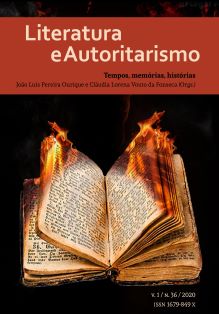In the Middle of the Rubbles, the Memory. Shoah and Trauma in the Fall
DOI:
https://doi.org/10.5902/1679849X63295Keywords:
Second World War, Literature of Testimony, MemoryAbstract
Literature and history have many affinities. Because both are constituted as narratives, they have the art of storytelling. We would like, with this work, to defend that it is also possible to study and reflect on some historical fact through the literary genre as if they were two margins that touch and mix. Thus, we list as object of study the novel published in 2011, authored by Michel Laub, entitled Diary of the Fall. The work in question brings the conflicts of the characters and their relationship with trauma and memory, as a result of the exposures to the shock experienced by the characters in Second World War. Our proposal is to reflect on this period, whose ruins still pulsate in the time-of-here-now. Finally, we intend to answer these questions in the course of our research, mainly based on the theories of Gagnebin (2009), Arendt (2012) and Adorno (1995). It is concluded, through the discussions presented, that there is a need to discuss Shoah in Brazil, since this atrocity appears as a stain on the history of the whole West and also because in the post-war period many Jewish immigrants came to reconstitute their lives in Brazilian territory thus having the precision of discussing their past and creating links between yesterday and today.Downloads
References
ADORNO, Theodor. Educação e Emancipação. Rio de Janeiro: Editora Paz e Terra [recurso eletrônico], 1995.
AMARAL, Jorge Fernando Barbosa do. A memória conflituosa em “Diário da Queda”. LING. – Est. e Pesq. Catalão-GO, vol. 18, n. 1, p. 79-88, jan./jun. 2014.
ARENDT, Hannah. Origens do Totalitarismo. São Paulo: Companhia das Letras, 2012.
BENJAMIN, Walter. Magia e técnica, arte e política: ensaios sobre literatura e história da cultura. (Obras Escolhidas v. 1) – 8ª ed. revista – São Paulo: Brasiliense, 2012.
DUFOURMANTELLE, Anne. Anne Dufourmantelle convida Jacques Derrida a falar Da Hospitalidade. / Jacques Derrida [Entrevistado]; Anne Dufourmantelle. Trad. de Antonio Romane. São Paulo: Escuta, 2003.
DUNKER, Christian Ingo Lenz. Estrutura e personalidade da neurose: a metapsicologia do sintoma à narrativa do sofrimento. Instituto de Psicologia da USP. São Paulo, v. 25, n. 1. p. 77-96, 2014.
GAGNEBIN, Jeanne Marie. Lembrar, escrever, esquecer. São Paulo: Editora 34, 2009.
HEINEBERG, Ilana. Dois olhares sobre a Shoah na literatura brasileira: uma leitura dos contos “O Retrato”, de Jacó Guinsburg, e “Na minha cabeça suja, o Holocausto”,
de Moacyr Scliar. WebMosaica. Revista do Instituto Cultural Judaico Marc Chagall. Porto Alegre/RS – vol. 3, n. 2, jul/dez, 2011.
LAUB, Michel. Diário da Queda. São Paulo: Companhia das Letras, 2011.
MENDA, Leniza Kautz. Diário da Queda: a força da transmissão entre gerações e a transgeracionalidade. WebMosaica. Revista do Instituto Cultural Judaico Marc Chagall. Porto Alegre/RS – vol. 5, n. 2, p. 20-30, jul./dez., 2013.
PARADISO, Silvio Ruiz. Identidade pós-moderna judaica na literatura de Holocausto. Uma análise em Moacyr Scliar. In: VI ENCONTRO INTERNACIONAL DE PRODUÇÃO CIENTÍFICA CESUMAR, 2009, Paraná, Anais. Paraná, VI EPCC, 2009.
SELIGMANN-SILVA, Márcio. A história como trauma. In: Arthur Nestrovski, Márcio Seligmann-Silva (Orgs.) Catástrofe e representação: ensaios. São Paulo: Escuta, 2000. p. 73-98.
TAVARES, GONÇALO. Uma menina está perdida no seu século à procura do pai. São Paulo: Companhia das Letras, 2015.
WALDMAN, Berta. Entre a lembrança e o esquecimento: a Shoá na literatura brasileira. Arquivo Maaravi – Revista Digital de Estudos Judaicos da UFMG. Belo Horizonte/MG, v. 9, n. 17. 2015.
Downloads
Published
How to Cite
Issue
Section
License
DECLARAÇÃO DE ORIGINALIDADE E EXCLUSIVIDADE E CESSÃO DE DIREITOS AUTORAIS
Declaro que o presente artigo é original e não foi submetido à publicação em qualquer outro periódico nacional ou internacional, quer seja em parte ou na íntegra. Declaro, ainda, que após publicado pela Literatura e Autoritarismo, ele jamais será submetido a outro periódico. Também tenho ciência que a submissão dos originais à Literatura e Autoritarismo implica transferência dos direitos autorais da publicação digital. A não observância desse compromisso submeterá o infrator a sanções e penas previstas na Lei de Proteção de Direitos Autorais (nº 9610, de 19/02/98).






